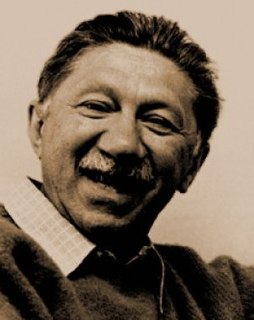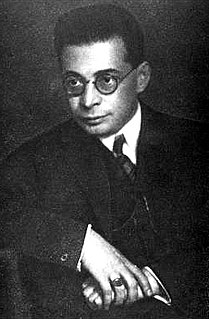An altered state of consciousness (ASC), also called altered state of mind or mind alteration, is any condition which is significantly different from a normal waking state. By 1892, the expression was in use in relation to hypnosis although an ongoing debate about hypnosis as an ASC based on modern definition exists. The next retrievable instance, by Dr Max Mailhouse from his 1904 presentation to conference, however, is unequivocally identified as such, as it was in relation to epilepsy, and is still used today. In academia, the expression was used as early as 1966 by Arnold M. Ludwig and brought into common usage from 1969 by Charles Tart. It describes induced changes in one's mental state, almost always temporary. A synonymous phrase is "altered state of awareness".

Abraham Harold Maslow was an American psychologist who was best known for creating Maslow's hierarchy of needs, a theory of psychological health predicated on fulfilling innate human needs in priority, culminating in self-actualization. Maslow was a psychology professor at Alliant International University, Brandeis University, Brooklyn College, New School for Social Research, and Columbia University. He stressed the importance of focusing on the positive qualities in people, as opposed to treating them as a "bag of symptoms." A Review of General Psychology survey, published in 2002, ranked Maslow as the tenth most cited psychologist of the 20th century.
Transpersonal psychology is a sub-field or "school" of psychology that integrates the spiritual and transcendent aspects of the human experience with the framework of modern psychology. It is also possible to define it as a "spiritual psychology". The transpersonal is defined as "experiences in which the sense of identity or self extends beyond (trans) the individual or personal to encompass wider aspects of humankind, life, psyche or cosmos". It has also been defined as "development beyond conventional, personal or individual levels".

Stanislav "Stan" Grof is a Czech psychiatrist, one of the founders of the field of transpersonal psychology and a researcher into the use of non-ordinary states of consciousness for purposes of exploring, healing, and obtaining growth and insights into the human psyche. Grof received the VISION 97 award granted by the Foundation of Dagmar and Václav Havel in Prague on October 5, 2007.
The transpersonal is a term used by different schools of philosophy and psychology in order to describe experiences and worldviews that extend beyond the personal level of the psyche, and beyond mundane worldly events.
Richard Neufeld is a Canadian Senator for British Columbia. Before his appointment to the Senate, he was a British Columbia Liberal Party Member of the Legislative Assembly of British Columbia from 1991 to 2008, serving as Minister of Energy, Mines and Petroleum Resources in the cabinet of Gordon Campbell.
Historically, depth psychology, was coined by Eugen Bleuler to refer to psychoanalytic approaches to therapy and research which take the unconscious into account. The term was rapidly accepted in the year of its proposal (1914) by Sigmund Freud, to cover a topographical view of the mind in terms of different psychic systems.

Sofia University is a private for-profit university located in Palo Alto, California, United States. It was originally founded as the California Institute of Transpersonal Psychology by Robert Frager and James Fadiman in 1975.
Jorge N. Ferrer is a US-based Spanish psychologist and participatory thinker, best known for his work bridging participatory theory with transpersonal psychology, religious studies, integral education, and sexuality and intimate relationships. He is the author of Revisioning Transpersonal Theory: A Participatory Vision of Human Spirituality (2002) and Participation and the Mystery: Transpersonal Essays in Psychology, Education, and Religion (2017), as well as the co-editor of The Participatory Turn: Spirituality, Mysticism, Religious Studies (2008), all published by State University of New York Press. Ferrer is a professor of psychology at California Institute of Integral Studies (CIIS), San Francisco, where he served as chair of the department of East-West Psychology.
Transpersonal anthropology is a subdiscipline of cultural anthropology and transpersonal studies. It studies the relationship between altered states of consciousness and culture.
Transpersonal ecology is a subfield of philosophy and ecology associated with the work of Warwick Fox, although the work of some other people, such as Rupert Sheldrake and James Lovelock, has some relevance to the field. The field might be considered to be one of several Transpersonal disciplines.
Transpersonal business studies is an area of interest within the field of transpersonal studies. It may be defined as businesses "in which the sense of identity or self extends beyond (trans) the individual or personal to encompass wider aspects of humankind, life, psyche or cosmos". Since the foundation of transpersonal psychology by Abraham Maslow in the late 1960s, other transpersonal disciplines have been considered.
Transpersonal disciplines are academic fields of interest that study the Transpersonal.
The Journal of Transpersonal Psychology (JTP) is a semi-annual, peer-reviewed academic journal which is published by the Association for Transpersonal Psychology. The journal is the principal publication in the field of Transpersonal psychology. According to sources the journal is addressing the interface between psychology and spirituality, and the area of spirituality as a legitimate topic for academic studies.
The Association for Transpersonal Psychology (ATP) is a membership-supported organization in the field of transpersonal psychology, founded in 1972. It grew out of the humanistic psychology and counterculture of the late 1960s.

Saybrook University is a graduate educational institution founded in 1971 by Eleanor Camp Criswell and others. It offers postgraduate education with a focus on humanistic psychology. It features low residency, master's and doctoral degrees and professional certification programs. The university is regionally accredited by the Senior Colleges and Universities Commission of the Western Association of Schools and Colleges (WASC). The university is classified as a Research Doctoral: Humanities/social sciences-dominant institution by the Carnegie Classification of Institutions of Higher Education. As of 2016 the university served 622 students. The university reports 156 full time and part time academic faculty.

Steve Taylor, Ph.D, born 1967, is a British author and lecturer in psychology who has written several books on psychology and spirituality. He is a senior lecturer in psychology at Leeds Beckett University.
Transpersonal sociology is a transpersonal discipline that is informed by the insights of Sociology.






